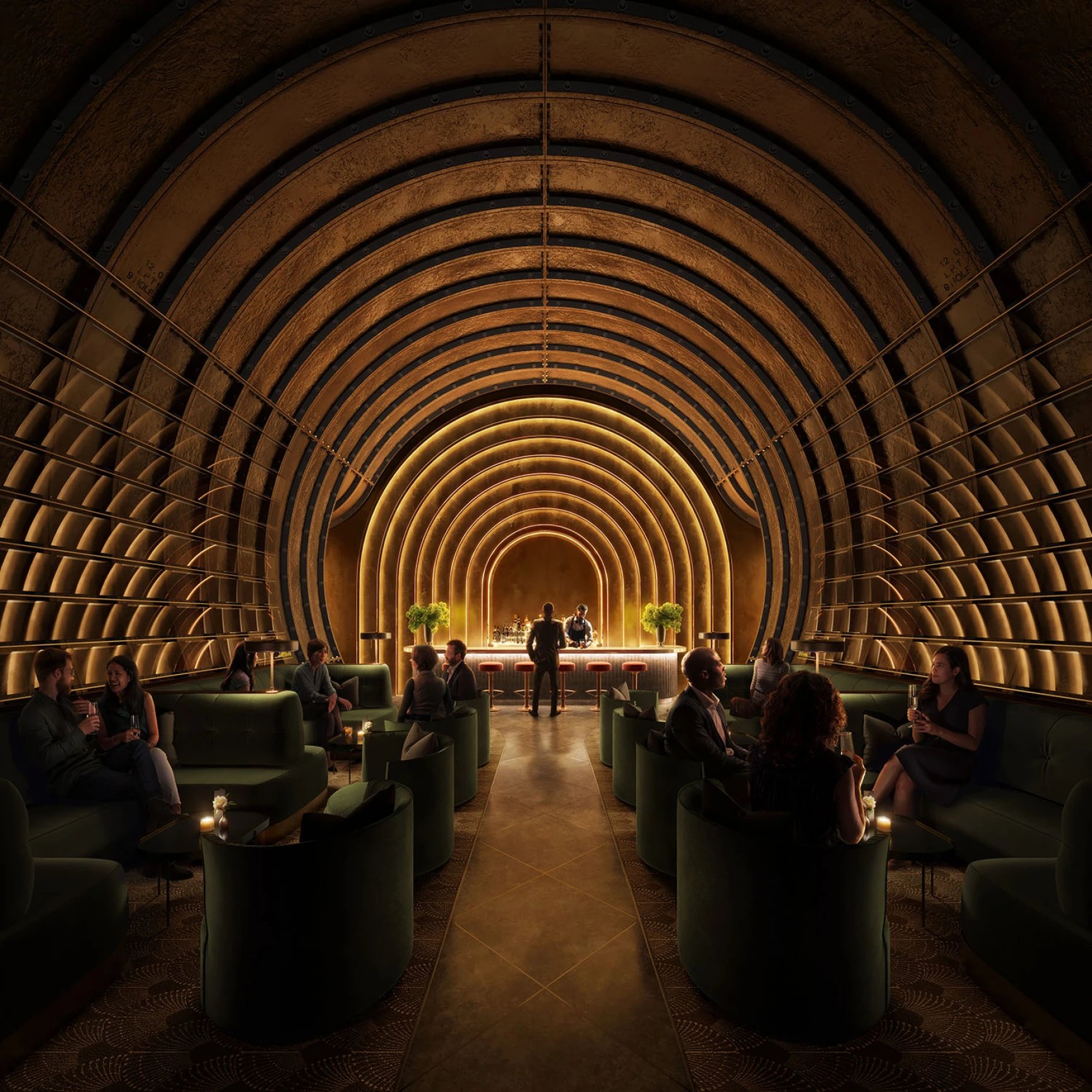London’s Secret WWII tunnels to open to public
London / United Kingdom
〰️
London / United Kingdom 〰️
Image: DBOX, artists impression.
TL;DR: After 70 years of government secrecy, plans to open the mile-long, underground WWII shelters in London that inspired James Bond’s “Q Branch” have been revealed.
So what? Soon you might be able to grab a cocktail in the deepest licensed bar in London—40 metres below ground, shaken by the rumble of the Tube above you.
This week plans have been unveiled for a USD$269million redevelopment of a secret network of underground tunnels in London. Originally built as air raid shelters during the WWII Blitz, the new design reimagines the tunnels as a cultural attraction in the heart of England’s capital which could attract an estimated two million visitors annually.
Architects WilkinsonEyre are known for their developments of iconic locations like Battersea Power Station in London, Gardens by the Bay in Singapore, and Crown Sydney, Australia. Subject to planning approvals, The London Tunnels vision is to transform them into “one of the world’s most unique cultural experiences,” says a statement from WilkinsonEyre. “It will bring to life the history of the tunnels by installing high-resolution large-scale curved immersive screens, together with interactive structures, scent emitting technology and hundreds of individual acoustic pinpoint speakers” creating an immersive digital-physical experience with the potential for collaborations with major artists, performers and curators.
"These secret spaces present the opportunity to tell extraordinary stories that helped shape the 20th century, alongside awe-inspiring digital immersive experiences,” said Paul Baker, Director at WilkinsonEyre.
Image: DBOX, artists impression.
Wait, Why Are there secret tunnels under London?
Originally built as a deep-level air raid shelter in the 1940’s to provide refuge for Londoners during the WWII Blitz, the Kingsway exchange tunnels sprawl over 8,000sqm, a staggering 40 metres beneath the ground. At just shy of 8m wide, the tunnels are so expansive that they can fit the breadth of three London buses side by side.
Over the years the tunnels played host to the Special Operations Executive, an offshoot of MI6. They eventually seeped into the pages of Ian Fleming’s James Bond novels, inspiring the legendary “Q Branch,” but the historical importance of the Kingsway Exchange tunnels doesn’t end there.
What were the London Tunnels used for?
The Kingsway exchange tunnels became a globally important, subterranean communications nerve center. At the dawn of the Cold War, the British Government significantly enlarged the size of the tunnels to house a secure, top secret, long distance telephone exchange and the first Transatlantic telephone cable, TAT1. In moments of geopolitical tension, such as the Cuban Missile Crisis, this 'hotline’ connected superpower capitals Washington and Moscow, and architects WilkinsonEyre plan to retain much of the original technology and equipment in their proposed design.
At its peak, the tunnels boasted a self-sufficient mini-city: housing up to 200 personnel, a self-contained water system, air conditioning, and even a hidden gem—the “deepest licensed bar” in London. Here, in a world away from the world, staff members could unwind at a restaurant with faux windows and play pool/snooker in the recreational area. However, by the late 1980s, the forward march of technology rendered the telecommunication hub obsolete.
Image: DBOX, artists impression.
Where are the London Tunnels?
The London Tunnels are in the heart of the UK capital, located at the intersection of London’s West End and the Square Mile. Nestled 40 metres beneath the Holborn district, the tunnels are a short walk from landmark cultural attractions like the British Museum, Covent Garden, the Royal Opera House and Soho. Their central location will make the tunnels easily accessible for both locals and tourists looking to delve into a lesser-known part of London's history alongside well known London tourist attractions.
Cut to the chase—WHEN DOES THE UNDERGROUND BAR OPEN?
The London Tunnels is hosting a series of events for the public to ask questions and learn more about the team behind the proposal. With community feedback requested before the planning application submission on November 5, we are still several years away from a subterranean martini.
“Our goal is to ensure that everyone regardless of their economic circumstances, can enjoy this unique experience. As such, we are committed to offering free tickets to school children and setting up a daily ballot for complimentary tickets,” said Angus Murray, the Australian born fund manager and CEO of The London Tunnels.
The future of innovation in London might not just be visible in its skyline—but preserved in the memories of technology hidden beneath the pavement.
To learn more about the project visit The London Tunnels.



